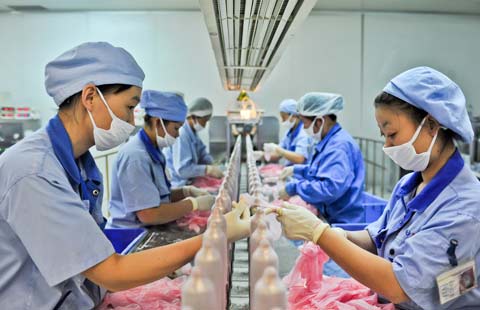Punish harshly for bad food, experts say
By Wang Qingyun (China Daily) Updated: 2014-07-22 07:30Food safety experts said China needs tougher measures in its laws to effectively supervise food makers and sellers.
In a program aired on Sunday, Dragon TV accused Shanghai Husi Food Co, a food-processing company owned by OSI Group, of violating China's Food Safety Law by using stale beef, chicken skin that had passed its sell-by date and defective hamburger to supply its clients.
"The case reflects that there is not yet a sound system to eliminate companies that make unqualified food products," said Wang Xu, associate professor of the law school at Renmin University of China.
According to the revised draft of the Food Safety Law, which is under review by the National People's Congress and open for public comment until July 31, consumers who have suffered from food that was not made according to the safety standard can ask makers not only to compensate them for damage but also to pay 10 times what they paid for the food or three times the cost of the damage.
However, the revision is not harsh enough to deter potential violators, said Zhang Yongjian, director of the Research Center for Development and Regulation of the Food and Drug Industry.
"A system should be set up to support consumers' claims for punitive damages, where the amount of compensation can be very large," he said.
"It costs little for large companies to compensate for the price of a couple of chicken thighs that have gone bad, but it can cost a huge amount when the court awards punitive damages."
Wang, the law professor, said the country should also consider setting up a system to protect whistleblowers as it cracks down on crimes concerning food safety.
The Food Safety Law and its draft revision both say that food makers should have some of their staff workers monitor the safety of the products being made.
There should be more specific regulations to encourage staff workers to provide tips on the violations of Food Safety Law by their employers, to make sure that the supervisor system works effectively, said Wang.
"For example, there should be regulations on the protection of their privacy and the confidentiality of their identity, and on how much they will be rewarded for the tips," he said.
On May 14, the central government passed the draft revision of the law in an executive meeting of the State Council. A statement from the meeting said that the revision aims to impose "the harshest inspection" on the whole process of food production and distribution, and "the harshest punishment" for violators.
Contact the writer at wangqingyun@chinadaily.com.cn
- Anti-smog gains marred by rising ozone levels
- Syndrome killing young workers in 'world's factory'
- Man saved from suicide kills himself
- 17 dead, 5million affected by Rammasun
- Namtso no longer Tibet's largest lake: research
- Red Cross defends use of winter quilts in summer
- Meat supplier of McDonald's, KFC suspended
- Fire sweeps through factories in Xinjiang
- Lunar rover is 'awake' but
faults continue - Six arrested in trafficking tiger cub bought online







